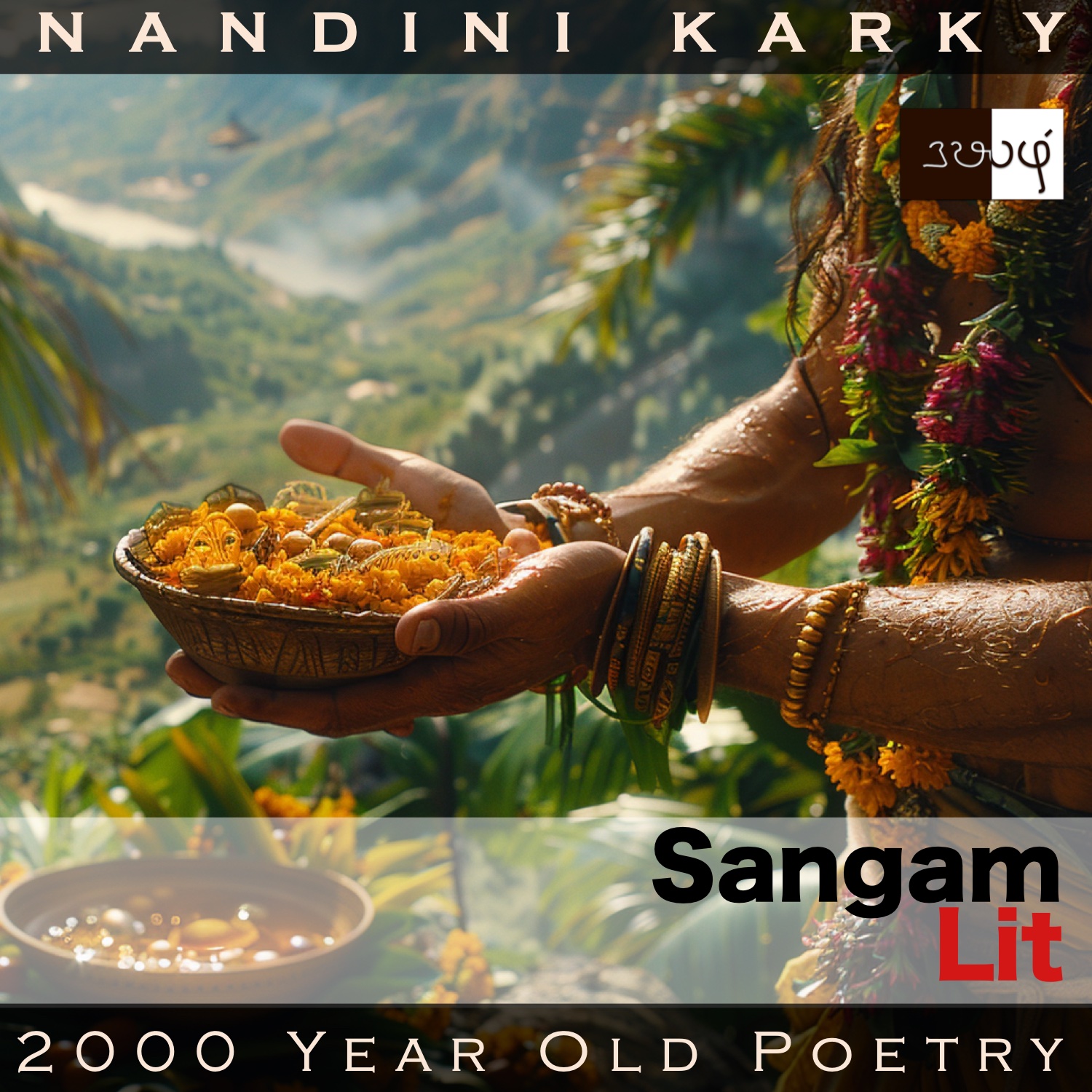Podcast: Play in new window | Download
Subscribe: Apple Podcasts | Spotify | Amazon Music | Android | iHeartRadio | Email | TuneIn | RSS | More
In this episode, we listen to a blessing rendered unto three kings, as portrayed in Sangam Literary work, Puranaanooru 367, penned for the Chera king Maavenko, Chozha king Perunarkilli and Pandya king Ukkira Peruvazhuthi by the poet Avvaiyaar. Set in the category of ‘Paadaan Thinai’ or ‘Praise’, the verse celebrates the unity of these three kings.

நாகத்து அன்ன பாகு ஆர் மண்டிலம்
தமவேஆயினும் தம்மொடு செல்லா;
வேற்றோர்ஆயினும் நோற்றோர்க்கு ஒழியும்;
ஏற்ற பார்ப்பார்க்கு ஈர்ங் கை நிறையப்
பூவும் பொன்னும் புனல் படச் சொரிந்து,
பாசிழை மகளிர் பொலங் கலத்து ஏந்திய
நார் அரி தேறல் மாந்தி, மகிழ் சிறந்து,
இரவலர்க்கு அருங் கலம் அருகாது வீசி,
வாழ்தல் வேண்டும், இவண் வரைந்த வைகல்;
வாழச் செய்த நல்வினை அல்லது
ஆழுங் காலைப் புணை பிறிது இல்லை;
ஒன்று புரிந்து அடங்கிய இருபிறப்பாளர்
முத்தீப் புரையக் காண்தக இருந்த
கொற்ற வெண் குடைக் கொடித் தேர் வேந்திர்!
யான் அறி அளவையோ இதுவே: வானத்து
வயங்கித் தோன்றும் மீனினும், இம்மெனப்
பரந்து இயங்கு மா மழை உறையினும்,
உயர்ந்து மேந் தோன்றிப் பொலிக, நும் நாளே!
One of those rare songs in which three great rulers are found together and are seen as a single integral force crucial to the well-being of the entire ancient Tamil land. The words of this prolific female poet can be translated as follows:
“Even if the divided domains, akin to heavenly regions, belong to oneself, these do not accompany in the end. Even if they happen to be strangers, it might go to people of might. Showering plenty of flowers and gold with moist hands to deserving priests, drinking toddy filtered through fibres, brought in golden vessels by women wearing freshly radiant jewels, with happiness, rendering rare and precious vessels to supplicants, you must live, in the days gifted to you;
Other than the good deeds done in life, there’s no other raft to take you across on the day you die. Akin to the three flames of the fire kindled by the born-again ascetics, you three should be of one mind and rule under victorious white umbrellas, with your flag-fluttering chariots, O kings!
This is all that I know: More than the shining stars in the skies, more than the resounding drops of rain that reside in huge, dark clouds, may the days of your life be more and shine with brilliance!”
Let’s delve into the details. The poet starts in the tone of the previous verses talking about the ephemeral nature of great kingdoms ruled by monarchs, and how even though they are like paradises, when the ruler leaves for the higher world, these lands do not go along with them. It might be possessed by strangers if they have the strength and might, says this poet. And so, be generous to priests and supplicants by showering all manner of gifts and offerings to them. Also, enjoy the earthly pleasures of good food and drink brought by bejewelled royal maiden, she adds. She instructs them that the only raft that will help anyone cross the river of death is that of good deeds done during one’s lifetime. Then, she addresses all three of them saying how they are like the flames of the fire kindled by devout ascetics, who have given up earthly pleasures and chosen a new life of abstinence. The poet concludes with the blessing that these kings must have more days of life than the stars in the sky and the raindrops in the clouds.
Yet again, it’s words conveying the reality of death, the importance of charity and blessing for a long life. What’s unique about this verse though is finding kings of the same region, who are expected to be perpetually at war, enjoying the company of each other and behaving in the manner of friends. Knowing the impermanence of wealth and land, perhaps these kings chose to focus on unity and well-being of their people- a lesson that’s valid even now, after two thousand years, to keep those dark human tendencies that seek war and conflict, at bay.




Share your thoughts...